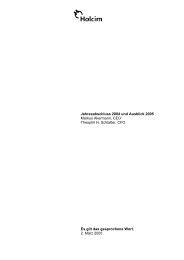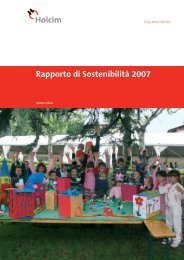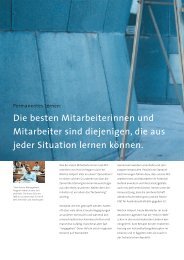Key success factors
Key success factors
Key success factors
You also want an ePaper? Increase the reach of your titles
YUMPU automatically turns print PDFs into web optimized ePapers that Google loves.
20 Value-Driven Corporate Management<br />
Organization and management<br />
The Group’s management and system of line responsibility<br />
is structured by regions. The Executive Committee is<br />
supported by efficient corporate staff units and modern<br />
management systems.<br />
Corporate governance also means efficient management<br />
and control<br />
Holcim knows that its credibility and reputation<br />
depend on professional and transparent corporate<br />
governance. This promotes confidence on the part<br />
of investors, business partners, employees and the<br />
public at large.<br />
The overall system of corporate governance, which<br />
includes directing, monitoring and organizing the<br />
highest corporate management levels, formulating<br />
business policy principles and applying internal and<br />
external control mechanisms, forms the basis for responsible<br />
management and control of the company<br />
with focus on sustainable value creation. Although we<br />
believe we have made great progress, this is an area<br />
in which efforts never cease.<br />
The Code of Conduct defines Group-wide standards of<br />
behavior expected of all staff and it underscores our<br />
responsibility as entrepreneurs and employers. The<br />
text of the current Code of Conduct can be found on<br />
our website under www.holcim.com.<br />
vidual Executive Committee members assisted by<br />
Area Managers and Corporate Functional Managers.<br />
In addition, each Executive Committee member has<br />
functional responsibility for specific corporate areas<br />
such as Cement Manufacturing, Commercial Services<br />
or Human Resources. This dual management approach<br />
gives Holcim an ideal combination of standardized<br />
Group-wide know-how and local value creation.<br />
If our Group companies are to strengthen their cost<br />
and market leadership in their markets, they need<br />
both entrepreneurial room for maneuver and support<br />
from the Group in the form of specific know-how and<br />
predefined parameters. In our view, <strong>success</strong> depends<br />
on striking a balance between local power and autonomy<br />
on the one hand and the right degree of support<br />
and intervention from Group headquarters on the<br />
other. A coherent program of basic and continuing<br />
management training, as well as systematic <strong>success</strong>ion<br />
planning to develop candidates with executive<br />
potential at both national company and corporate<br />
level, are important <strong>factors</strong> in the drive to strengthen<br />
the Group.<br />
Dual line and functional management responsibility<br />
Holcim is globally active with around 90,000 employees<br />
on five continents. We manufacture and distribute<br />
our core products cement and aggregates in countless<br />
local markets, along with products and services based<br />
on these core products in the ready-mix concrete,<br />
asphalt and concrete products sectors. The key to the<br />
Group’s <strong>success</strong> lies in the competence of our local<br />
management teams. The operating units in over<br />
70 countries fall under the line responsibility of indi-<br />
Holcim’s efficient and lean organizational structure<br />
enables it to respond rapidly to new challenges.<br />
Holcim’s hierarchical structures are flat and its divisions<br />
of responsibility clearly defined – both at Group<br />
level and in the individual Group companies.










